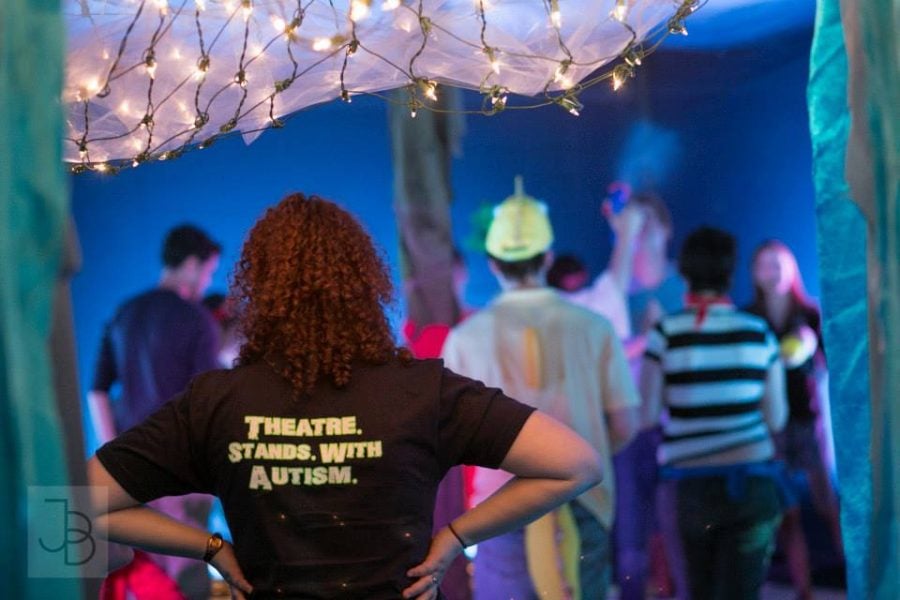Seesaw Theatre’s annual Inclusive Theatre Festival returns, brings local theatres for diverse audiences together
Daily file photo by Justin Barbin Photography
Before it was Seesaw Theatre, the organization was named “Theatre Stands With Autism” and was a special event for Purple Crayon Players.
November 14, 2022
Seesaw Theatre presented its Seventh Annual Inclusive Theatre Festival on Saturday and Sunday — a weekend-long conference that invites local theatres intended for diverse audiences to celebrate progress and collaborate.
At Northwestern, Seesaw’s mission is to produce shows for disabled audiences. Weinberg junior and ITF Conference Director Monica Williams said Seesaw began conducting research and contacting participants for the festival over the summer. One of inclusive theatre’s challenges is visibility, she said, so ITF seeks to spread awareness about diverse types of theatre.
“I’ve done theatre since fourth grade, and (inclusive theatre) had never even entered my realm of possibility until freshman year,” Williams said. “ITF is a place for students and professional artists to come together and really talk about how it’s going in the world of disability theatre-making.”
This year’s festival is the first in-person conference since 2019. Presenters from Evanston and Chicago gave talks and hosted workshops at Norris University Center for theatre professionals, the disabled community and educators working in inclusive theatre.
Communication senior and Seesaw Artistic Director Rachel Hilbert said inclusive theatre is a relatively new field, so the festival seeks to create contact between new companies and artists to share strategies for producing inclusive theatre.
“Sensory theatre is so broad in terms of the ways you can do it, and how you can do it well,” Hilbert said. “There’s so much to take from every organization that does stuff like this.”
Hilbert said Seesaw’s primary audience is both NU students and community members from Evanston and the Chicago area with disabilities, including those with autism. Hilbert said Seesaw has also produced shows for blind and deaf viewers.
Because Seesaw’s mission is broad, Hilbert said the conference can inform attendees about different types of audiences. She said it’s important to understand differences so theatres can provide viewers with better specificity and accommodation.
“It’s really exciting that there’s enough people in the world making inclusive art,” Hilbert said.
Some speakers included members from Babes with Blades, a theatre company that recently produced “Othello” with an all-female, trans and gender non-conforming cast. Gianni Carcagno, a Chicago stage manager and theatre technician, gave a DIY captioning and accessibility workshop.
Special Gifts Theatre gave a presentation about productions for actors with disabilities. The company brought student ambassadors to the conference to demonstrate typical production strategies, like improvising based on a prompt. Other techniques were modified to accommodate the actors; the team shortened songs for those who felt more confident performing a shorter piece.
Debbie Taus-Barth, SGT’s director of program operations, said the company is one of Chicago’s only therapy-based performing arts programs.
“We use the stage as a platform for skill-building and social confidence,” Taus-Barth said during the presentation. “Everything we do is adaptive and very specific to every student in our program.”
Taus-Barth said last season, a nonverbal and hearing-impaired actress played Dorothy in “Wizard of Oz.” The team modified the script to accommodate her disability and highlight her ability to act the role nonverbally, she said. Other actors verbally told the story for hearing audiences, and Taus-Barth said the actress “was able to shine” through physical storytelling.
Williams said she is most excited about how inclusive theatre has the potential to open artistic doorways for more artists and audiences. She said ITF is not only meant to make theatre accessible for more viewers, but it is also a celebration of diverse artists’ contributions to the performing arts.
“Inclusive theatre is taking this art form that we all love so much and making it so that every single person can participate in it, however their heart wants,” Williams said.
Email: [email protected]
Twitter: @ash_goren
Related Stories:
—Nine years in, Seesaw Theatre’s co-founders reflect on its past


